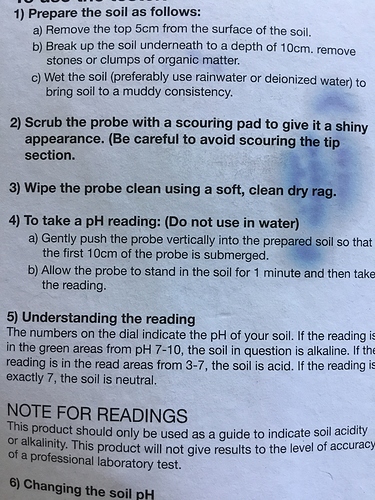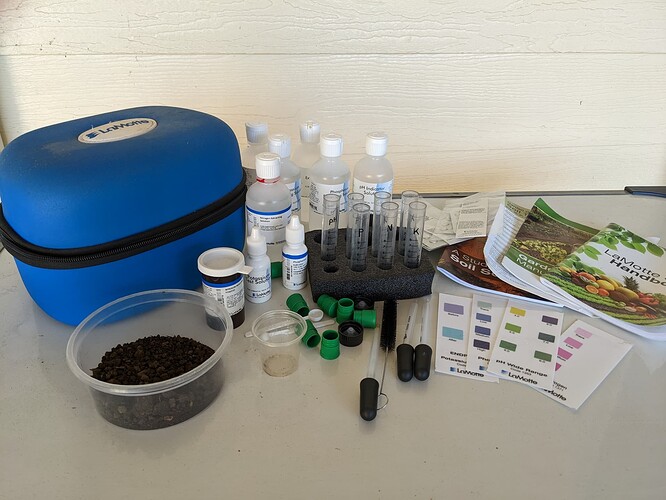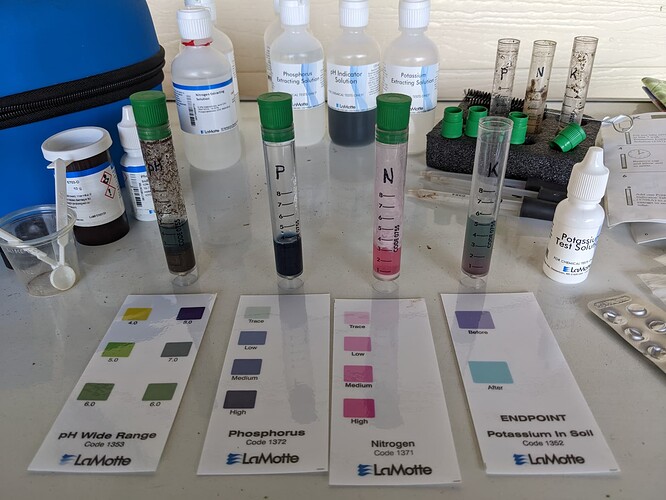Is anyone using the Ryset ph and moisture meter? Bought one recently and I’m wondering how accurate it is. The results I get for soil testing differ quite a bit from the results with my old strip tester. And when I placed the meter in a glass of water, the result was “moist” - not “wet” which is what I expected!
Welcome to the community.
I’m old school and use my finger to asses soil moisture level, but I need a meter to assess the ph in our hydroponics system.
I’m not sure about the moisture meter component, but if your meter is not calibrated it will give you the wrong ph readings.
Have you calibrated your meter? Have you got a bottle of ph7 buffer solution to do the calibration with?
From one source it appears in order of decreasing reliability/accuracy for soil testing. It
Laboratory test
Litmus/paper strip Test kits
Liquid colour/dye test kits.
In ground residential probes.
It would seem reasonable that repeatability depends on calibration and consistent methods.
Noting @meltam
Ryset list on their web site a calibration solution kit.
My Searles “Quick and Easy to Use” soil pH tester came with these not so quick and easy to use instructions. Draw your own conclusions.
P.S.
My needs may be a little different.
I only need the red side of the scale around the 5 mark, our norm. I don’t think it adds value.
Possibly not that accurate.
Accurate soil moisture probes include things like tensiometers and neutron probes. These need to be calibrated to the soil (soil samples taken and correlated to the probe reading).
There are others like gypsum blocks, but these need soil moisture correlation as well.
A stick in the ground type probes won’t be accurate as they aren’t calibrated/correlated to a particular soil. They may only at best give an indication of whether moisture exists or not…and whether a pot/plant may need watering. Whether this moisture is available to the plants is another matter. Overwatering is usually not an issue for most plants when gauges prove not to be reliable.
Being cheap, they may be more of a novelty rather than a scientific piece of kit.
Having also had anomalous results from such devices I have little faith in them. Without getting too complex accurate pH probes are glass electrodes which are expensive and delicate. Metal electrodes are cheaper and tougher but not accurate. My main concern is they tend to be erratic, giving results that vary for no apparent reason.
Single probe type are the worst because they rely on an electrochemical effect that is dependent on moisture and pH. I don’t know how you untangle the two under those circumstances.
Is this the model you have? I may have more to say if it is.
Thank you for your reply. I didn’t know the meter had to be calibrated! I’ll try to do it.
Thank you for your reply syncretic. Yes, that is the model I have, and I’d be interested to hear what you have to say about it.
Thank you phb. A frustrating business for something that should be simple!
Thank you for your detailed reply. There’s obviously more to this business of soil testing!
I cannot give you an authoritative answer re the Ryset twin probe as it would need to be tested in the field and the results compared to a proper laboratory analysis - and that I cannot find. This vendor like most others does not give any information about how it works nor any data on its accuracy and precision. Whether anybody has done any such test is hard to say. There are two problems here.
- Look at the Ryset version here. Now compare it to this one labelled “Sonkir” and this one that is a no-name. They are all basically the same thing, the Sonkir says it also has a light meter and the no-name is confused about whether it does or not. I cannot determine who actually makes it so finding a matching review or the maker’s website are both hard.
- Laboratory tests are expensive and require careful procedure so it will take some resources to do a proper comparison of several dozens models and very few want to do that. Consider this review. It concludes that the Sonkir is great. It says double needle tech is “premium”. I agree on theoretical grounds it is better than one but that is only because single probe is terrible. That mob do not describe how they test and having said accuracy is important do not test accuracy! This mob also claim the Sonkir is accurate and reliable but give no clue how they know this.
It looks to me that the web reviews of this class of gear is like web recipes, you see the same thing over and over because they all copy from each other and don’t acknowledge it. If anyone can find a solid review that actually does measurements please say where.
Someone recommended a book on soil analysis some time back, somewhere in a thread on the Gardening forum (?) - I can’t find it.
I am writing an article for the Fruit Club and would like to get all the info I can to do a well researched series on pH, major elements NPK, trace elements, testing, etc. Any other recommended sites, books, resources etc?
Thanks!
Growing Media for Ornamental Plants and Turf by Kevin Handreck and Neil Black. I have posted this as a good reference book in a number of threads.
Check to see if a local library has one if you can’t afford it. It covers a range of physical and chemical parameters and is well written.
Kevin Handreck is a well recognised soil scientist who worked for the CSIRO.
The ASSSI, which I am a member, also hold regular short courses on introduction to soils which may be interest to your fruit club members. The short courses have a charge and usually run over a few days. You can email them (contacts on their website) to ask for information on upcoming sessions.
It might be of assistance to discuss your needs with one of the Land Environment and Water staff/officers for your area. What is or has been successful commercially in your locality will also be a useful guide.
Stating the obvious there are two needs. To understand what types of conditions (soils etc) suit particular crops, and a second need to identify the characteristics of the soils available in the backyard. Potted alternatives are often the better option.
From the web the following may be of interest.
Our experience is firstly all about climate. Added to that we look to what is grown successfully locally and whether our site is similar. Hence finger limes are in and olives are out, passionfruit will thrive but apples will not. It’s always possible to modify soils, but climate is not so easy. Which rules out truffles, saffron and wasabi, unless potted in a refrigerated greenhouse making those an exception.
There are various soil testing services. Paid for of course.
EG
‘Agricultural soil testing - Southern Cross University
I use a dye indicator pH test kit from Manutec. It works well and is I think more reliable that the probe systems, at least the cheaper ones. It is cheap, quick and easy to use. I cannot test it but a fellow from my organic growers club had access to equipment and said it was accurate to half a pH unit. If liming take it slowly and re-test 6 months later, adding more if required. Building up and adjusting your soil is best done progressively, trying to rush you may overshoot. Manutec also makes trace elements mix which may be required, especially for heavy feeders like citrus.
For a group interested in fruit I recommend The complete Book of Fruit Growing in Australia by Louis Glowinski. It is written for local conditions (no instructions on how to save your trees when the temperature drops to below zero Fahrenheit) comprehensive and well structured; recommended by many including Stephanie Alexander, and Don Burke. Get it for club library.
As far as comprehensive soil testing goes it is expensive and for me not necessary. You can learn much about soils structure and bulk content by examining it yourself and doing a few simple tests. Aside from keeping up the macro nutrients, according to the needs of your plants, you can tell if they are missing elements often by observation of colour and pattern changes.
I have been using LaMotte’s Garden Kit, which tests pH, NPK. I have also developed a few other tests of my own. It comes with guides to help interpret results, choose suitable plants and strategies to correct deficiencies or alter pH. I chose this one because the CSIRO research said that acid wash extraction was more accurate.
It takes about an hour to do the tests, although I have streamlined the process. pH is the easiest - just add soil, the reagent, shake and allow to settle. Others have up to four steps.
I found the Manutec pH test a bit hard to read the colour of the powder, and over the years the colours have faded on the chart. La Motte is easier.
Because the group is the Rare Fruit, members tend to be growers of fruit & nuts that are not native to the area and are not “mainstream” so they either fail or have to do some alterations to their soils or microclimates. Doing the newsletter, is a challenge, in more ways than one. I like to do a technical piece, a common fruit, a native fruit, an unusual fruit and a something “for small gardens” as we picked up new members over the last two years that only have a balcony or small yard. I cover planting, propagation, growing, pruning, pollination, pests, diseases, harvest, nutrition & recipes. Garden events, citizen science, competitions, resources & meeting minutes.
You could try Diggers as they have some great experience with soils and growing.
The following link is Diggers member content only


